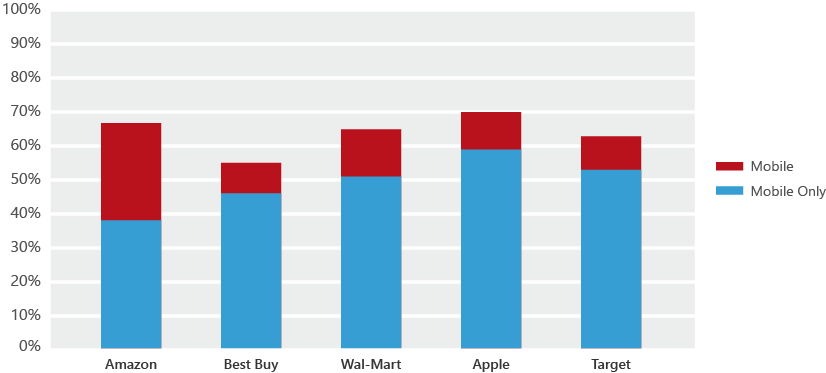It’s no secret that smart phones, tablets, and other mobile devices have become extremely popular in the last 5 years. In fact, they’ve become so prevalent that they’ve reshaped how we access the internet; recently even creating a new consumer demographic, the “mobile only” user. This demographic describes a user that does not access the internet on desktop or laptop devices, preferring to use devices like smart phones and tablets instead.
Mobile Internet Engagement - 2015

In 2015 this demographic grew a considerable amount, actually surpassing mobile users that also use desktops or laptops. Overall, this serves to further cement the idea that companies absolutely need a mobile presence to not miss this new segment of mobile only users. Additionally, being competitive in delivering the optimum customer experience in today’s market requires more than just simply having a mobile presence. Instead, it requires an engaging, effective mobile presence that excels in areas where its competitors might fail or provide a less than optimum experience. One of the most common platforms for a mobile presence is a “responsive” website, however native mobile applications offer a wider variety of unique features and opportunities that can be instrumental in creating a superior user experience.
Standing out from your Competitors
Existing in the native mobile application space allows you to differentiate your company from the competition. By developing a mobile application companies can better target and serve mobile customers, providing a more effective, tailored experience than would be possible with a mobile ready website. This is especially important for companies trying to break into a new market, or a highly contested market, as the added benefits in features with mobile applications will most likely be a major decision point for your future customers.
Give Customers Access to Mobile Features
The most significant advantage of a mobile application, compared to a mobile website, is the application’s ability to utilize the unique native functionalities that a smart phone or tablet provides. These native functionalities include, but are not limited to, geolocation services, access to the device’s files and information, and access to the device’s camera. For some mobile apps access to these features are extremely crucial. For example, Instagram’s core functionality of taking and posting photos would be impossible without access to the user’s camera and photo files. Overall, these unique native functionalities can allow your app to provide a rich, fully integrated user experience that users will prefer over the limited capabilities of a normal mobile website. This improved user experience not only attracts new users but also helps to retain current users who may be exploring other services or platforms.
Push Targeted Content
Another key mobile feature only available to mobile applications is the ability to access a device’s push notifications. Push notifications are a great way to engage with consumers, especially since they are standardized across different devices and extremely familiar to users. In fact, 44% of mobile app users say they would prefer having brands deliver deals and coupons directly to their mobile devices (source: Millward Brown). Push notifications are perfectly suited towards this kind of promotional activity because they appear directly on the user’s device, not hidden in an email or promotional message on a website, which further drives brand engagement and increases consumer loyalty.
Drives Smooth Customer Experience
The processing power of mobile devices has become extremely powerful, even in just the past year. However, mobile websites cannot harness this power to its full potential because mobile browsers often slow down the connection between the user and the content or feature they’re trying to access. Mobile applications bypass this bottleneck as they are directly integrated into the mobile device, allowing for much more complex functionality to run smoothly for the user. This smoothness is a deciding factor for future engagement with many mobile users, as mobile applications seem quicker, more responsive to user actions, and overall more familiar due to their similarity to other native mobile applications.
Enable Real-Time Information
The higher performance capabilities of mobile applications also allow for unique user experiences and functionalities that would be practically impossible for a mobile website due to the mobile browser bottleneck. A perfect example of this is the turn by turn navigation feature of the Google Maps mobile app. That turn by turn feedback needs to be almost instantaneous for the user in order for the feature to be useful, even a short delay could result in a user missing a turn or straying off the intended route. Mobile applications can eliminate that delay, however mobile websites cannot, making mobile applications the best choice when you want to provide your user with accurate real time information. This real-time information is extremely valuable to consumers as it makes their user experience seem instantly responsive to their actions, an important distinction that will set your mobile app apart from mobile competitors that cannot eliminate that delay.
Provide Offline Capabilities
One of the biggest differences between a mobile application and a mobile website is that the app can be accessed directly from your smart phone’s home screen, while a mobile website requires a browser to access. This difference means that mobile websites require an internet connection to access and interact with, but some mobile apps can function without internet connectivity as they are contained completely within the mobile device.
For example, Evernote is a popular note taking program that has both a website and a mobile application. Both versions of Evernote function very similarly, however the mobile app still functions perfectly without an internet connection. This offline capability makes the mobile app much more valuable to its consumer base than the website, which is one of the reasons why Evernote gained popularity through their mobile app instead of through their website.
In 2016, and in coming years, a mobile presence for your brand will only become more and more crucial. Additionally, the mobile consumer space is becoming increasingly more competitive as brands adapt their websites and services to be mobile ready. Because of that competition, just having a mobile presence is no longer enough to guarantee repeated consumer engagements. Instead, to succeed your brand’s mobile component must also be highly optimized, providing a smooth, intuitive user experience. Choosing to create a mobile application, over just a mobile ready website, can provide your brand with the tools and functionality required to set yourself above your competitors and give consumers a flawless user experience they will enjoy coming back to time and time again.
Let Dunn Solutions Build Your Native Mobile App
The Dunn Solutions team are experts at building and integrating native mobile apps. Our team supports iOS, Android, and hybrid mobile apps which can integrate to your targeted content or marketing platforms. Our customers also leverage mobile applications to automate business processes which are “in the field” – creating an enter once and forget it type of experience. Contact us at info@dunnsolutions.com if you would like to talk about your next game changing application.



